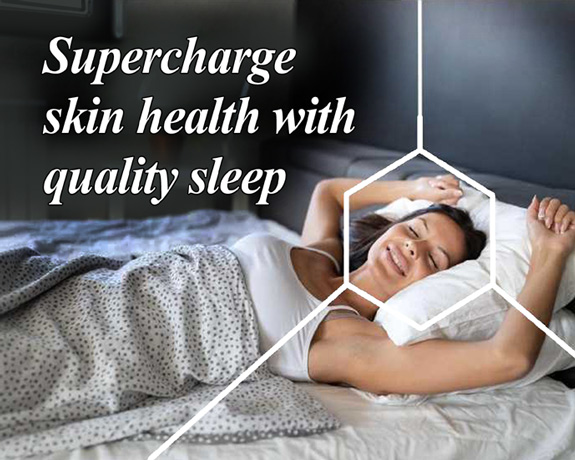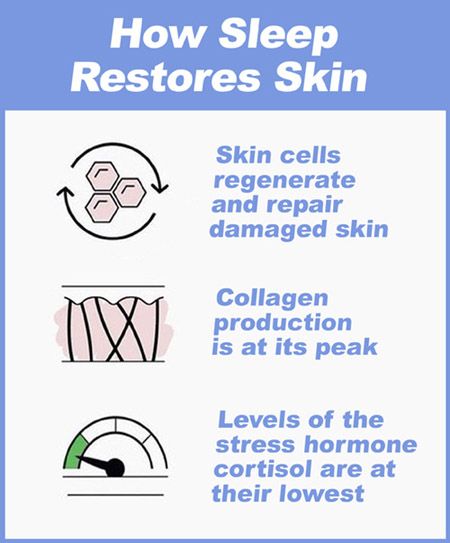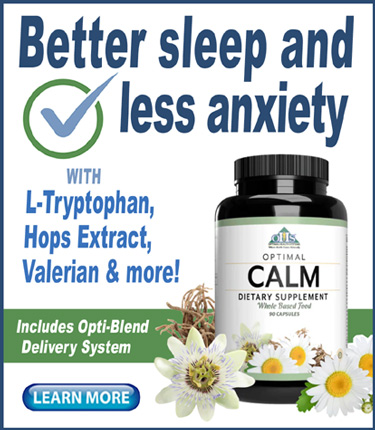Sleep studies conducted in recent decades have established beyond any doubt that sleep quality is linked to good health.
In fact, a recent study documented how a single disruptive night could compromise the immune system.
But what most people don’t realize is the negative health consequences of poor sleep also affect skin health and appearance.
While “beauty” is somewhat in the eye of the beholder, most people would agree that wrinkles, bags under the eyes, acne or blotchy skin are undesirable. And these are some of the aspects of beauty that are negatively affected by poor sleep.
The negative results can happen faster than most people realize.
In a 2021 study on 24 women, short-term sleep restriction, defined as just three hours of sleep per night for two nights in a row, reduced skin elasticity and made wrinkles more noticeable.
These unwanted changes aren’t just noticeable to researchers, but to casual observers. According to a 2010 study, after a few nights of reduced sleep, other people found study subjects as “less attractive, less healthy and more fatigued.”
The collagen connection
Sleep is more complicated than people realize. The body moves through distinct stages that facilitate different restorative functions. Slow-wave sleep is the primary stage during which the body prioritizes tissue repair, muscle recovery and collagen production. Collagen is the vital protein that keeps skin firm and elastic.
During slow-wave sleep, cortisol, the body’s main stress hormone, falls to its lowest point. A lower cortisol level protects the vital collagen, reduces inflammation and supports the skin barrier.
A 2010 study showed the hormonal disruptions that occur with sleep loss elevate cortisol.
Also during slow-wave sleep, higher levels of growth hormone and another hormone called prolactin are complementing the restoration.
They do this by regulating and enhancing the immune system, promoting cell growth, and encouraging tissue repair—all critical steps in helping the skin recover from daily stressors.
Hydration good, oxidation bad
Adequate sleep also provides the restive time skin needs to optimize hydration. When the skin maintains moisture better its “barrier function” job is improved and a person feels less skin irritation.
In contrast, sleep deprivation increases water loss through the skin, leaving it drier and more vulnerable to damage and visible signs of aging.
This is why so many beauty products market “moisturizing” capabilities.
While quality sleep provides a time for the body to heal, poor sleep does the opposite. A 2017 study documented how sleep loss accelerates oxidative stress—an imbalance between cell-damaging molecules and the body’s defenses. This impairs the very processes that keep skin resilient. Over time, these changes accelerate biological aging and leave the body less resilient to daily stressors.
Health and beauty killer: chronic sleep deficiency
While it’s impossible to avoid getting a bad night’s sleep (or two) once in a while, falling into a situation where it’s happening all the time is the real danger.
When a person gets fewer than seven hours of sleep per night for at least three months, and the situation has led to daytime fatigue or impaired functioning, it is referred to as chronic sleep deficiency. (It is also referred to as insufficient sleep syndrome and chronic sleep deprivation.)
A new 2025 study revealed that chronic sleep deficiency “disrupts estradiol circadian rhythms, resulting in compromised epidermal barrier function and diminished dermal collagen synthesis.”
In short, without consistent quality sleep low grade inflammation is constant and overnight restoration and healing is undermined.
We used to think it was cute when our grandparents would say, “I need to get my beauty sleep.” They instinctively knew how important sleep was. When they got a bad night’s sleep, they could see the effects in the mirror.
Today no one should think of “beauty sleep” as a cute antidote. Our grandparents had to rely on instincts, but today we have the benefit of quality research. And the conclusions are undeniable: a healthy body and appearance depend on quality sleep!
– – –
You can support your own healthy sleep habits by supplementing with Optimal Calm by Optimal Health Systems.
The unique blend of herbs and other nutrients in Optimal Calm also help prevent anxiety, mood swings, fat gain, high blood pressure, and more. Click the banner ad on this page to learn more.
– – –
Sources: Sleep Medicine, The British Medical Journal, Wikipedia (slow-wave sleep), International Journal of Endocrinology, PlosOne.org, Cells (MDPI.com).



